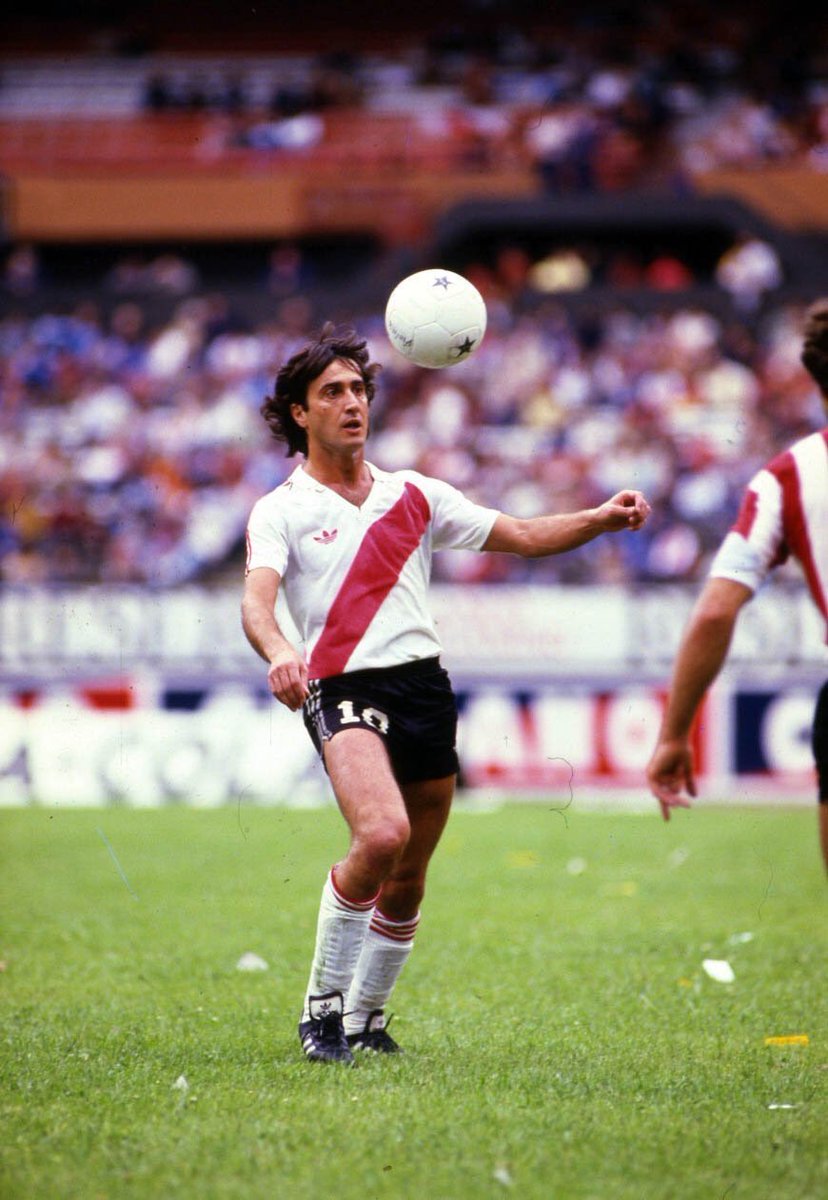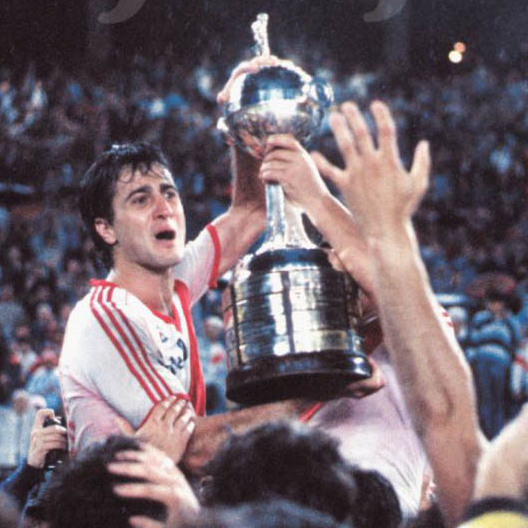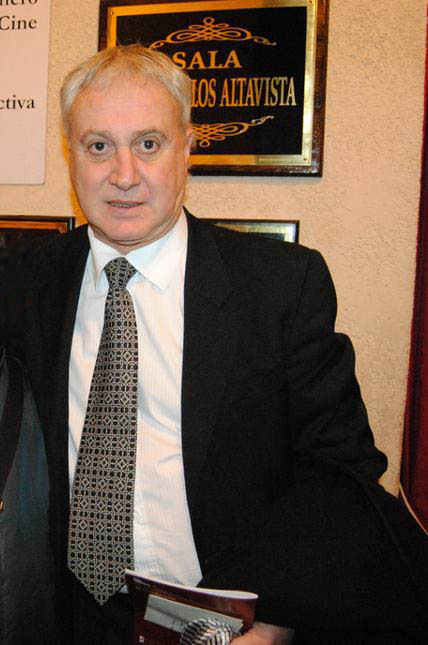1. Early Life and Youth Career
Norberto Alonso was born on 4 January 1953 in Vicente López, Buenos Aires Province, Argentina. He grew up in the working-class suburb of Los Polvorines, an area predominantly inhabited by those of modest economic means. Alonso began his football journey within the youth system of Club Atlético River Plate, joining the club during a challenging period often referred to as River Plate's "dark period." This era, spanning from 1957 to 1975, saw the club endure an 18-year drought without winning a championship title, a stark contrast to their earlier successes. Alonso's formative years in this environment were crucial to his development as a player, shaping his resilience and skill as he ascended through the ranks.
2. Club Career
Norberto Alonso's professional club career was largely defined by his three spells at River Plate, interspersed with a brief stint in France and a period with Vélez Sarsfield. Throughout his career, he was known for his significant contributions as an attacking midfielder and forward, playing a pivotal role in ending River Plate's long championship drought and securing major international titles.
2.1. First Spell at River Plate (1970-1976)
Alonso made his professional debut with River Plate in 1970. During the early 1970s, River Plate was in a period of significant challenge, having not won a league title for 18 years. The club's fortunes began to change with the arrival of coach Ángel Labruna in 1975. Under Labruna's guidance, Alonso emerged as a pivotal figure, anchoring the team and consistently wearing the coveted number 10 jersey. With the addition of key reinforcements such as Roberto Perfumo and Ubaldo Fillol, and the maturation of talents like Daniel Passarella, Carlos Morete, J. J. López, and Reinaldo Merlo, Alonso led the squad to a historic achievement in 1975. That year, River Plate won both the Metropolitano and the Nacional tournaments, decisively ending their protracted championship drought. This success marked the beginning of a golden era for the club, as they would go on to win seven local titles between 1975 and 1981.
2.2. Move to Olympique Marseille (1976-1977)
In 1976, following his successful period with River Plate, Norberto Alonso was transferred to Olympique de Marseille in the French Ligue 1. His time in France, however, proved to be brief and largely unsuccessful. He struggled to adapt to the new environment and his performances did not meet expectations. As a result, River Plate promptly arranged for his return to the club in 1977.
2.3. Second Spell at River Plate (1977-1981)
Upon his return to River Plate in 1977, Norberto Alonso quickly re-established himself as a vital component of the team. Between 1979 and 1981, River Plate continued their domestic dominance, securing four more local titles. During this period, the club was renowned for its deep squad, considered one of the most expensive teams in the world. They boasted a first team, often featuring Alonso and Leopoldo Luque, primarily used for league games, and an equally prestigious second team, including players like Juan José Carrasco and Ramón Díaz, who were frequently utilized in Copa Libertadores matches.

Despite the team's ongoing success, Alonso's relationship with then-coach Alfredo Di Stéfano became increasingly strained. During the 1981 Nacional tournament, which River Plate eventually won, Alonso frequently clashed with Di Stéfano. The coach often overlooked Alonso for the first team, preferring to give playing time to younger talents such as Carlos Daniel Tapia and José María Vieta in his position. Following the conclusion of the Nacional tournament, these conflicts led to Alonso being placed on the transfer list, and he was subsequently sold to Club Atlético Vélez Sarsfield in 1982.
2.4. Vélez Sarsfield (1982-1983)
After his departure from River Plate due to disagreements with coach Alfredo Di Stéfano, Norberto Alonso joined Club Atlético Vélez Sarsfield in 1982. During his two-year spell at Vélez Sarsfield, he played alongside veteran striker Carlos Bianchi, who was a prominent figure in Argentine football. Alonso's time at Vélez provided him with consistent playing opportunities, allowing him to maintain his form and contribute to the team's efforts before his eventual return to his beloved River Plate.
2.5. Third Spell at River Plate and Retirement (1984-1987)
Norberto Alonso made his final return to River Plate for the 1984 season, marking his third spell at the club where he was most revered. During this period, River Plate's youth system continued to produce a wealth of talented midfielders, including Alejandro Sabella, Néstor Gorosito, and Pedro Troglio, who would also leave their mark on Argentine football.

Alonso proved to be a crucial player in the highly successful 1985-86 season. Forming an effective partnership, most notably with Uruguayan star Enzo Francescoli in 1985, Alonso played a key role in River Plate's historic achievement of winning their first ever Copa Libertadores in 1986. Following this continental triumph, he also contributed to the team's victory in the Intercontinental Cup later that year, completing a remarkable treble.
Alonso's illustrious professional career concluded with his retirement in 1987. By the time he retired, he had amassed an impressive record of 166 goals in 464 matches across all his club stints. His deep connection with River Plate fans was evident through the long-standing chant of "Alooo... Aloooo..." sung in his honor at the Estadio Monumental. His elegant and capable playing style was widely acknowledged and respected by supporters of all clubs, who often responded with their own chants in acknowledgment of his skill.
3. International Career
Norberto Alonso's international career with the Argentina national team saw him participate in one of the nation's most historic triumphs. He was included in the Argentine squad for the 1978 FIFA World Cup, which was hosted on home soil. Despite his selection, coach César Luis Menotti did not initially have Alonso prominently in his tactical plans. There were suggestions that his inclusion in the squad might have been influenced by political pressure from figures such as Carlos Lacoste, a prominent figure in the military government of the time.
During the tournament, Menotti afforded Alonso only limited playing time. Notably, due to Argentina's policy at the time of numbering players alphabetically for the World Cup, Alonso, a midfielder, famously wore the number 1 jersey, typically reserved for goalkeepers. While Argentina went on to win their first World Cup title, with Mario Kempes emerging as the top scorer, Alonso's direct on-field contribution was minimal.
In 1983, under the new national coach Carlos Bilardo, Alonso was given some playing opportunities. However, Bilardo ultimately opted to utilize younger talents in his position, such as Diego Maradona, Jorge Burruchaga, and Carlos Daniel Tapia. As a result, Alonso's international appearances remained relatively limited throughout his career, with a total of 19 caps and 4 goals for the national team between 1978 and 1983.
4. Playing Style and Characteristics
Norberto Alonso was renowned for his distinctive and elegant playing style, which made him one of the most recognizable and influential players of his generation. Operating primarily as an attacking midfielder or occasionally as a forward, Alonso possessed exceptional technical ability, vision, and a keen eye for goal. He was characterized by his exquisite ball control, accurate passing, and an uncanny ability to dictate the tempo of the game from the midfield.
Alonso's creativity and intelligence on the field allowed him to consistently unlock defenses with precise through balls and clever dribbling. His proficiency in set pieces, particularly free-kicks, further added to his offensive threat. Fans and opponents alike acknowledged his refined skill and tactical awareness, often describing him as an "elegant and capable player." His ability to blend artistry with effectiveness made him a memorable figure in Argentine football history.
5. Post-Retirement Activities

After concluding his illustrious playing career in 1987, Norberto Alonso transitioned into various post-retirement ventures. He embarked on a career in business, notably opening an insurance agency. Additionally, he became a partner in several commercial investment projects. Despite his significant footballing achievements, Alonso did not actively pursue a role as a public advertising figurehead. His commercial appeal to football fans outside of River Plate was somewhat limited, particularly as Diego Maradona had become the dominant national icon following his heroics at the 1986 FIFA World Cup.
In 1989, Alonso briefly returned to River Plate in a coaching capacity, forming a co-managerial partnership with his former teammate, Reinaldo Merlo. However, their tenure was short-lived. The duo was dismissed mid-season when Alfredo Davicce assumed the club presidency, fulfilling an election promise to bring in another River Plate legend, Daniel Passarella, as the new coach. Despite their early departure, River Plate ultimately went on to win the championship that season.
6. Achievements and Honours
Norberto Alonso's career was marked by numerous significant achievements at both club and international levels, cementing his legacy as one of Argentine football's greats.
6.1. Club
River Plate
- Primera División: 1975 Nacional, 1975 Metropolitano, 1979 Nacional, 1979 Metropolitano, 1980 Metropolitano, 1981 Nacional, 1985-86
- Copa Libertadores: 1986; runner-up: 1976
- Intercontinental Cup: 1986
6.2. International
Argentina
- FIFA World Cup: 1978
6.3. Individual
- El Gráfico awards:
- Argentine Primera División Best Player: 1972 Nacional, 1975 Metropolitano, 1981 Metropolitano
- Argentine Primera División Best 11: 1972, 1975, 1981
- El Mundo (Venezuela) awards:
- South American Footballer of the Year second place 1975
- Seventh place 1972 and 1976
- Konex Award: One of the Best Argentinian Players of Decade: 1990
- Clarín Awards: Included in the greatest "numbers 10" of Argentina: 2010
- Copa Libertadores All-Time Dream Team by Bolavip
- River Plate All-Time Dream Team by Marca: 2020
- IFFHS Argentina All-Time Dream Team (Team C): 2021
7. Legacy and Reception
Norberto Alonso holds a profound and enduring legacy in Argentine football, particularly as an iconic and symbolic figure for River Plate fans. His elegant playing style, characterized by exceptional skill and vision, earned him widespread admiration, with supporters of all clubs recognizing him as an elegant and capable player.
Alonso's instrumental role in ending River Plate's prolonged championship drought in 1975, followed by the club's unprecedented successes in the late 1970s and mid-1980s, including their first Copa Libertadores and Intercontinental Cup titles, cemented his status as a club legend. He is affectionately remembered by River Plate supporters, who would famously chant "Alooo... Aloooo..." in his honor at the Estadio Monumental. His influence transcends mere statistics, representing a golden era for the club and embodying the artistic and winning spirit of River Plate football.
8. Career Statistics
Norberto Alonso's professional career spanned from 1970 to 1987, primarily with River Plate, where he accumulated significant appearance and goal tallies.
8.1. Club
| Club | season | Metropolitano | Nacional | Total | |||
|---|---|---|---|---|---|---|---|
| matches | goals | matches | goals | matches | goals | ||
| River Plate | 1971 | 10 | 1 | 13 | 2 | 23 | 3 |
| 1972 | 26 | 12 | 15 | 9 | 41 | 21 | |
| 1973 | 16 | 3 | 10 | 6 | 26 | 9 | |
| 1974 | 10 | 1 | 14 | 6 | 24 | 7 | |
| 1975 | 28 | 20 | 12 | 7 | 40 | 27 | |
| 1976 | 14 | 1 | 0 | 0 | 14 | 1 | |
| Total | 104 | 38 | 64 | 30 | 168 | 68 | |
| Olympique de Marseille | 1976-1977 | 17 | 3 | - | - | 17 | 3 |
| Total | 17 | 3 | - | - | 17 | 3 | |
| River Plate | 1977 | 0 | 0 | 14 | 6 | 14 | 6 |
| 1978 | 14 | 15 | 17 | 8 | 31 | 23 | |
| 1979 | 13 | 8 | 13 | 5 | 26 | 13 | |
| 1980 | 24 | 7 | 16 | 8 | 40 | 15 | |
| 1981 | 20 | 6 | 11 | 0 | 31 | 6 | |
| Total | 71 | 36 | 71 | 27 | 142 | 63 | |
| Vélez Sarsfield | 1982 | 24 | 2 | 13 | 2 | 37 | 4 |
| 1983 | 24 | 4 | 12 | 6 | 36 | 10 | |
| Total | 48 | 6 | 25 | 8 | 73 | 14 | |
| River Plate | 1984 | 27 | 7 | 9 | 3 | 36 | 10 |
| 1985 | - | - | 9 | 3 | 9 | 3 | |
| 1985-1986 | 15 | 5 | - | - | 15 | 5 | |
| 1986-1987 | 4 | 0 | - | - | 4 | 0 | |
| Total | 46 | 12 | 18 | 6 | 64 | 18 | |
| Career Total | 464 | 166 | |||||
9. External Links
- [https://web.archive.org/web/20070929092432/http://www.riverdetroit.com/BetoCareer.html Alonso's statistics at River Detroit]
- [http://futbolistasblogspotcom.blogspot.com/search/label/Alonso Profile and Statistics]
- [https://web.archive.org/web/20071020025519/http://futbolfactory.futbolweb.net/index.php?ff=historicos&f2=00001&idjugador=653 Futbol Factory profile]